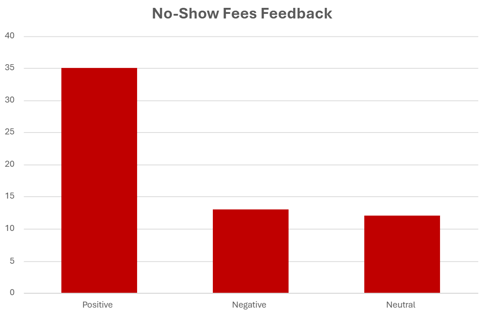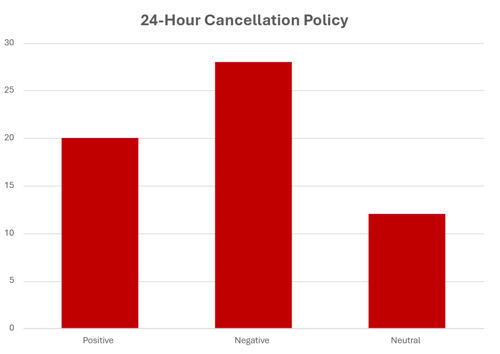15 Sep 2025
Revision to Block Booking Terms and Conditions ICIA document
PDF | 576.899kb
This document explains the steps CalMac took while carrying out an Islands Community Impact Assessment (ICIA) for changes to the block booking terms and conditions. It gives a quick overview of what the assessment covered and walks through the process we followed, based on the Islands (Scotland) Act 2018.
The process followed is aligned to and references the following:
|
Conducting Authority |
CalMac Ferries Ltd (CalMac) |
|
Island Scope |
Network wide |
|
Island Representative Body |
CalMac Block Booking Commercial Customers The following island representative groups were informed of the consultation with block booking commercial customers but were not required to participate in the consultation:
The Coll Ferry Committee The Tiree Transport Forum The Arran Ferry Committee The Mull & Iona Ferry Committee The Campbeltown Ferry Committee The Jura Ferry Committee The Colonsay Ferry Committee The Islay Community Council Ferry Committee (ICCFC) Comhairle Nan Eilean Siar (CNES) Harris Transport Group/Forum Barra Transport Committee South Uist Business Impact Group Ferry Community Board
|
As part of our commitment to improving fairness, accountability, operational efficiency and service delivery we are currently undertaking a review of the Block Booking Terms and Conditions for commercial customers ahead of the Winter 2025/26 timetable. These changes aim to address operational challenges, maximise deck space, and respond to ongoing disruption across the network.
An ICIA is required under the Islands (Scotland) Act 2018 and as specified in the Islands (Scotland) Act 2018 the ICIA will:
As specified in the Islands (Scotland) Act 2018, on completion of the ICIA, CalMac will have:
(see Appendix 1 for further detail as regards to rationale and purpose)
The ICIA process commenced on 26 May 2025 with an expected completion date at the end of September. The customer consultations commenced on 13 June 2025 and completed on 23 July 2025. During the 30-day consultation period 18 meetings were held from 19 June 2025 to 1 July 2025 with a combination of mixed group meetings and one-to-one meetings at customer’s request. 39 companies attended the consultation sessions with 49 individual attendees. Once the 30-day consultation period finished all commercial customer comments/feedback were captured and collated, findings determined, and recommendations finalised within 10 days. The island communities in scope were informed of expected timescales and justification provided for any changes to timescales as required.
Scottish Government Islands Policy and Communities Team are available for guidance and support on the ICIA process.
The objective of this consultation is to gather feedback on the proposed changes to the Block Booking Terms and Conditions from our commercial customers. This process aims to ensure the Block Booking Terms and Conditions amendments are transparent, considers the full range of factors affecting commercial customers and is reflective of the diverse needs of our service users. Ultimately, our goal is to be as inclusive as possible and capture the diverse requirements of our commercial customers and where appropriate be considered for inclusion in the amended Block Booking Terms and Conditions. In so doing this should enhance the overall service by optimising deck space for the benefit of all customers.
Our goal is to prevent late cancellations and no shows and thus optimise deck space for all customers. The aim of this consultation is to collate feedback on the proposed changes to the Block Booking Terms and Conditions from our block booking commercial customers. This process seeks to ensure all customers are aware of the proposed changes, and accounts for the unique nature of island businesses.
The combination of increased demand and a lack of adherence to and enforcement of Block Booking Terms and Conditions has resulted in our need to review our Block Booking Terms and Conditions and propose changes. Hence the need to consult with our block booking commercial customers.
As part of our commitment to improving fairness, accountability, operational efficiency and service delivery we have reviewed the Block Booking Terms and Conditions for commercial customers ahead of the Winter 2025/26 timetable. These changes aim to address operational challenges, maximise deck space, and respond to ongoing disruption across the network. Block bookings play a key role in how we provide a service to our commercial customers; these have not been strictly implemented over the past few years, and commercial customers have had no financial implications for no shows. It has been recognised that several customers are not fully utilising their block bookings, and we are continuing to see no shows having an impact on deck space utilisation across the network. We have received feedback from ferry committees and several commercial customers about a lack of ability to make bookings only for space to transpire at time of boarding. This has caused a real sense of frustration among customers and stakeholders alike. While late cancellations and no shows are not the only cause for space becoming available at time of boarding, it is a significant contributing factor hence the need to address Block Booking Terms and Conditions, amend and enforce.
The most salient clauses within the Block Booking Terms and Conditions are highlighted below. In summary, they relate to late cancellations, where less than 24 hours notice is given, customer no shows and utilisation of less than 80%.
| Cancellation Option | Fees |
| No show | No charge applied |
| Amendments | Free of charge |
Beyond emphasising the importance of the Block Booking Terms and Conditions and the need to adhere to them to ensure the maximum space is freed up for all customers, the primary purpose of the proposal is to consult on:
The process for conducting the ICIA, along with the revised Block Booking Terms and Conditions following consultation is set out in the downloadable document at the bottom of this page.
CalMac fulfilled their commitment to review the commercial customer Block Booking Terms and Conditions and aligned this review with the ICIA process. The full process has been participative and has enabled an in-depth understanding to be gathered of the specific challenges faced by commercial customers directly and island communities indirectly. With over 50 responses to the consultation, CalMac are extremely grateful to everyone who participated and welcomed all feedback. This helped provide reassurance that the final amended Block Booking Terms and Conditions were reviewed considering customer feedback with amendments benefiting all customers and with welcomed improvements for commercial customers and island communities alike. The feedback received allowed the Block Booking Terms and Conditions amendments to be adjusted to reflect the realities and concerns of those affected.
The goal is to optimise deck space utilisation, reduce 'no-shows' and late cancellations while improving operational efficiency and customer satisfaction.
The aim is to cancel unnecessary block bookings from the system as early as possible, to ensure all customer groups have access to guaranteed bookings, and in so doing, reduce the need for customers to go 'standby' on the day of travel.
The misuse of block bookings can impact deck space utilisation and capacity across the network.
Some block booking customers are not adhering to the current Terms and Conditions, and we are continuing to see no shows and late cancellations within 24 hours of departure.
We want to effectively manage bookings and maximise deck space utilisation and to achieve this we must work with our customers to imbed good working practices.
Port teams, ferry committees, and the local community are regularly reporting concerns. Customers are aware of unused space being held under block bookings but cannot access it opting instead to travel standby. On arrival, they often see empty deck space, leading to frustration. Some have taken photos and shared them on social media, increasing public scrutiny and dissatisfaction. However, it must be recognised that the above is not always down to the commercial customer.
*terms and conditions sent out to block booking customers prior to consultation
In total 113 companies were invited to the consultation sessions, out of which 39 (35%) customers accepted and 74 (65%) declined.
In total 39 companies provided feedback via our consultation sessions (34%), 21 provided feedback via our feedback form, by email or phone call (19%) and 53 provided no feedback (47%). Overall, we received feedback from 53% companies.
As you can see from the chart shown and the information below, customers were generally supportive of the introduction of no-show fees.

*Neutral – the customer did not provide any positive or negative feedback towards the proposal, and the points made did not reference no show fees.
As you can see from the chart, there were a significant number of customers who were negative towards the 24-hour cancellation policy.

*Neutral – the customer did not provide any positive or negative feedback towards the proposal, and the points made did not reference the cancellation policy.
|
Theme Raised |
Answers |
|
Several customers have raised concerns over the 24-hour cancellation period, stating that this is unworkable for their business. Due to the nature of each business, some require greater flexibility and are weather dependent. |
Due to feedback received we have amended the current cancellation time from 24 hours prior to sailing time to 2:00PM the day prior to travel. |
|
If customers are penalised for no-shows, they expect compensation or accountability when sailings are cancelled at short notice by CFL. |
Unfortunately, at this time CalMac does not have a commercial compensation scheme. |
|
Ongoing vessel disruption resulting in cancellations make it difficult to plan, and customers are hesitant to cancel due to fear of last-minute disruption. |
While we appreciate the current challenges due to unprecedented disruption across the network, we can’t have bookings retained by customers as a contingency to cover for last-minute disruptions. This results in substantial space being taken up unnecessarily only for it to be released at the last minute. This negates businesses ability to plan ahead if spaces only become available at the last minute. |
|
Larger commercial customers are monopolising freight capacity due to excessive block bookings. |
Block booking requests will be reviewed considering actual utilisation; this will result in more accurate allocation of bookings and a greater amount of space made available to all customers. |
|
Some customers believe the changes are premature given the current instability of the network and no further changes should be made until the fleet and e-booking systems are more reliable. |
The Block Booking Terms and Conditions have been without adherence or enforcement. The increase in no shows / late cancellations and poor utilisation has resulted in the review of the current terms & conditions, and implementation of amended terms & conditions. |
|
Customers are willing to collaborate but request ongoing consultation and a delay in implementation. |
The majority of customers agreed with the no show fee. Due to the feedback given regarding the 24-hour cancellation policy, we changed this to 2pm the day prior to travel. As a result of the feedback received, there was not a need to have further consultations with customers. |
|
There is a perception that the current approach penalises hauliers who are not responsible for the underlying issues, and that the role of CalMac as a lifeline service is being overlooked in favor of cost-saving and revenue generation. |
While we recognise that many commercial customers do adhere to our Block Booking Terms and Conditions there is still a requirement to address inappropriate booking behaviour, allowing for space to be freed up and used by all customers across the network. |
|
There should be limits on block bookings based on actual usage and prevent allocations to third parties. Concerns were raised regarding unfair trading practices. |
Block booking requests will be reviewed considering actual utilisation, the terms and conditions have also been amended to prevent block booking customers transferring their requests to third parties. |